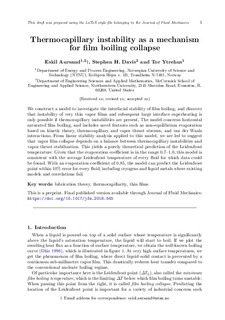Thermocapillary instability as a mechanism for film boiling collapse
Journal article, Peer reviewed
Accepted version
Permanent lenke
http://hdl.handle.net/11250/2585455Utgivelsesdato
2018Metadata
Vis full innførselSamlinger
Sammendrag
We construct a model to investigate the interfacial stability of film boiling, and discover that instability of very thin vapour films and subsequent large interface superheating is only possible if thermocapillary instabilities are present. The model concerns horizontal saturated film boiling, and includes novel features such as non-equilibrium evaporation based on kinetic theory, thermocapillary and vapour thrust stresses and van der Waals interactions. From linear stability analysis applied to this model, we are led to suggest that vapour film collapse depends on a balance between thermocapillary instabilities and vapour thrust stabilization. This yields a purely theoretical prediction of the Leidenfrost temperature. Given that the evaporation coefficient is in the range 0.7–1.0, this model is consistent with the average Leidenfrost temperature of every fluid for which data could be found. With an evaporation coefficient of 0.85, the model can predict the Leidenfrost point within 10 % error for every fluid, including cryogens and liquid metals where existing models and correlations fail.
